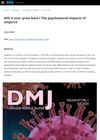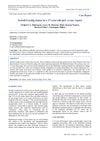 May 2023 in “Dermatology online journal”
May 2023 in “Dermatology online journal” Kids with vitiligo, psoriasis, or alopecia areata are more likely to experience anxiety, depression, and social challenges.
 January 2021 in “Dalhousie Medical Journal”
January 2021 in “Dalhousie Medical Journal” Alopecia, a hair loss issue, needs both medical and psychological treatments due to the limited effectiveness of drugs alone.
 7 citations,
July 2019 in “International archives of internal medicine”
7 citations,
July 2019 in “International archives of internal medicine” Common skin conditions can greatly affect a person's mental health and social life.
 30 citations,
September 2020 in “Journal of Patient-Reported Outcomes”
30 citations,
September 2020 in “Journal of Patient-Reported Outcomes” Alopecia Areata (AA) causes significant emotional distress, including feelings of embarrassment, depression, and anxiety, and impacts social interactions and daily activities.
 June 2024 in “Skin Health and Disease”
June 2024 in “Skin Health and Disease” Men with alopecia often feel less confident and have lower wellbeing, needing more support.
 January 2024 in “Annals of Dermatology”
January 2024 in “Annals of Dermatology” Female pattern hair loss greatly affects women's quality of life, causing mild depression and anxiety, and increases medical expenses.
 April 2024 in “Nigerian Postgraduate Medical Journal”
April 2024 in “Nigerian Postgraduate Medical Journal” Androgenetic alopecia is a common hair loss condition influenced by various factors and linked to psychosocial and cardiovascular issues.
 April 2024 in “International journal of reproduction, contraception, obstetrics and gynecology”
April 2024 in “International journal of reproduction, contraception, obstetrics and gynecology” A 17-year-old girl was diagnosed with a rare ovarian tumor, emphasizing the need for fertility preservation and psychosocial care.
12 citations,
January 2020 in “Indian Dermatology Online Journal” Female pattern hair loss has multiple causes and treatments, with new therapies showing promise.
 4 citations,
November 2022 in “Frontiers in Medicine”
4 citations,
November 2022 in “Frontiers in Medicine” People with alopecia areata are more likely to have anxiety and depression and a lower quality of life.
 1 citations,
September 2023 in “Journal of drugs in dermatology”
1 citations,
September 2023 in “Journal of drugs in dermatology” Alopecia areata causes unpredictable hair loss and emotional distress, with no cure and limited treatment options.
 2 citations,
January 2011 in “Elsevier eBooks”
2 citations,
January 2011 in “Elsevier eBooks” Early treatment of acne is crucial to prevent scarring and psychological effects.
 1 citations,
May 2015 in “Primary Health Care”
1 citations,
May 2015 in “Primary Health Care” Effective acne treatment varies by type, with topical and oral medications showing strong evidence, and patient education and support are crucial.
 43 citations,
September 2012 in “International Journal of Dermatology”
43 citations,
September 2012 in “International Journal of Dermatology” Hormonal therapies are safe and effective for treating adult women's acne.
 3 citations,
June 2004 in “Reviews in gynaecological practice”
3 citations,
June 2004 in “Reviews in gynaecological practice” Early treatment and weight management are important for teenagers with PCOS to reduce symptoms and long-term health risks.
 2 citations,
January 2023 in “Dermatology practical & conceptual”
2 citations,
January 2023 in “Dermatology practical & conceptual” COVID-19 diagnosis is linked to new or worsening hair diseases, with stress from the pandemic likely contributing.
 January 2007 in “Elsevier eBooks”
January 2007 in “Elsevier eBooks” Alopecia areata is a reversible, autoimmune-related hair loss that can have significant emotional impact and uncertain treatment effectiveness.
 4 citations,
July 2021 in “International Journal of Environmental Research and Public Health”
4 citations,
July 2021 in “International Journal of Environmental Research and Public Health” Women who lost hair from childhood head radiation are more likely to face mental health issues than men.
 20 citations,
July 2009 in “Journal of Pediatric and Adolescent Gynecology”
20 citations,
July 2009 in “Journal of Pediatric and Adolescent Gynecology” Quick treatment of hair disorders in teenage girls is important because of the emotional effects.
36 citations,
December 2014 in “F1000 prime reports” The document concludes that Hidradenitis suppurativa is often underdiagnosed, lacks definitive treatment, and requires better awareness and management strategies.
 4 citations,
March 2022 in “Dermatology and Therapy”
4 citations,
March 2022 in “Dermatology and Therapy” People with moderate hair loss from Alopecia Areata feel more impacted than those with no or almost complete hair loss, and are more likely to seek treatment.

Current treatments for alopecia areata often fail to achieve and maintain significant hair regrowth.
 14 citations,
July 2019 in “Experimental and Molecular Medicine”
14 citations,
July 2019 in “Experimental and Molecular Medicine” Nanog gene boosts stem cells, helps hair growth, and may treat hair loss.
 15 citations,
February 2017 in “International Journal of Women's Dermatology”
15 citations,
February 2017 in “International Journal of Women's Dermatology” Hair camouflage offers various options for hair loss, helping reduce psychological impact.
 12 citations,
November 2016 in “International Journal of Women's Dermatology”
12 citations,
November 2016 in “International Journal of Women's Dermatology” Various hair camouflage options help people with hair loss improve appearance.
 10 citations,
March 2018 in “Anais Brasileiros De Dermatologia”
10 citations,
March 2018 in “Anais Brasileiros De Dermatologia” More hair loss leads to higher risk of psychosexual disorders, especially in women.

Men with androgenetic alopecia may have a higher risk of metabolic syndrome.
 October 2022 in “Dermatology practical & conceptual”
October 2022 in “Dermatology practical & conceptual” People with hidradenitis suppurativa are more likely to have bipolar disorder than those with psoriasis or without skin conditions.
 May 2021 in “Lasers in Surgery and Medicine”
May 2021 in “Lasers in Surgery and Medicine” Minoxidil and photobiomodulation together improve hair growth better than minoxidil alone.
 18 citations,
May 2016 in “Annals of Medicine”
18 citations,
May 2016 in “Annals of Medicine” The article concludes that correctly diagnosing systemic causes of hair loss requires a detailed clinical evaluation and a systematic diagnostic approach.




























